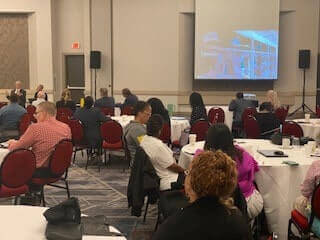
N.C. A&T Mourns the Rev. Jesse Jackson Sr. ’64
02/17/2026 in University Advancement, College of Arts, Humanities and Social Sciences
By Labrina VanCliff / 06/04/2024 Academic Affairs
EAST GREENSBORO, N.C. (June 4, 2024) – North Carolina Agricultural and Technical State University recently hosted its highly anticipated two-day 2024 Faculty Enrichment Workshop.
 The workshop, “Aligning AI Themes of Future Teaching, Research, and Interdisciplinary Collaboration,” was organized in collaboration with the N.C. A&T Extended Campus and Faculty Affairs.
The workshop, “Aligning AI Themes of Future Teaching, Research, and Interdisciplinary Collaboration,” was organized in collaboration with the N.C. A&T Extended Campus and Faculty Affairs.
“The workshop reinforced North Carolina A&T State University’s commitment to advancing AI in research, teaching, and learning,” said Tonya Smith-Jackson, Ph.D., provost and executive vice chancellor of Academic Affairs. “AI research and the use of AI tools have been integral to the university for over a decade, well before the COVID-19 pandemic accelerated public interest in these technologies.”
The workshop began with a plenary speaker introduction and opening presentation, which emphasized opportunities for collaboration across AI initiatives. Attendees participated in a fireside chat and Q&A session featuring Fay Cobb Payton, Ph.D., a member of the A&T Board of Visitors, and Shaun Gleason, Ph.D., of Oak Ridge National Laboratory.
Concurrent sessions offered deep dives into specialized topics, such as “AI + The Arts,” with speakers Julia McHugh, Ph.D., Mark J.V. Olson, Ph.D., and Marshall N. Price, Ph.D., of Duke University. Another session, “AI + Trustworthy Systems + Future of Work (Talent),” featured insights from Kaushik Roy, Ph.D., Department of Computer Science chair in A&T’s College of Engineering (COE) and Roy Carter, M.F.A., associate professor in the Department of Visual and Performing Arts at A&T’s College of Arts, Humanities and Social Sciences (CAHSS).
For her keynote presentation, Denae Ford Robinson, Ph.D., of Microsoft Research, discussed interdisciplinary issues affecting generative AI and CoPilot. Further concurrent sessions addressed ethics and usability in an AI world, and AI + human-centered/machine-centered approaches, featuring speakers Hyung Nam Kim, Ph.D., associate professor in the Department of Industrial and Systems Engineering at COE; Andrew Kuo, M.A., lecturer in the Department of Criminal at CAHSS; Joseph Stephens, Ph.D., professor in the Department of Psychology at CAHSS; and Ahmad Patooghy, Ph.D., assistant professor in the Department of Computer Systems Technology in A&T’s College of Science and Technology.
Sessions encouraged active participation and networking through ideation sharing, speed dating-style exercises and team formation activities, facilitated by Audrey Dentith, Ph.D., director of academic teaching and learning at A&T, and Sherell Fuller, Ph.D., assistant director for A&T’s Center for Teaching Excellence.
The second day of the workshop included presentations on the quality and validity frameworks for generative AI by David Olaleye, Ph.D., of the SAS Institute Inc., and security implications of large language models by doctoral candidate Tia Pope and Anna Godwin, M.S., of RTI International.
A keynote presentation by I-Sah Hsieh, principal program manager at SAS, provided insights on research trends in the AI for good domain. Additionally, A&T Information Technology Services’ technology support analyst Tracey H. Bridges, M.S., and instructional designer Danielle A. Crosby, Ph.D., gave a presentation on unleashing student potential with generative AI.
In early August 2023, A&T established an AI Working Group, comprised of faculty and administrators focused on advancing AI through teaching and research. This group released a statement of principles for AI use, endorsed by the Faculty Senate. The Faculty Senate is collaborating with the university’s Center for Academic Excellence to develop a standard syllabus statement related to AI.
Daniel Limbrick, Ph.D., associate professor in the Department of Electrical and Computer Engineering at COE, is advancing the frontiers of microprocessing and autonomous vehicles through the development of small-scale testbeds for autonomous vehicle scenarios. These innovative testbeds provide physical platforms to rigorously test and explore the capabilities and limitations of edge computing, extending research beyond traditional computational modeling.
In pursuit of assured, robust, and resilient services for autonomous systems at the edge, Limbrick and his team are focusing on two critical, interdependent components of cyber-physical autonomy: situational awareness and learning-enabled control and adaptation. By running autonomous driving software integrated with artificial intelligence on these testbeds, the research aims to replicate real-world scenarios with precision, driving forward the development of reliable and adaptive autonomous vehicles.
“N.C. A&T State University’s 2024 Faculty Enrichment Workshop was a remarkable convergence of academic excellence and cutting-edge AI innovation. By fostering interdisciplinary collaboration and spotlighting the transformative impact of AI in education, research, and the arts, we have set a new standard for future-focused academic enrichment,” said Craig Rhodes, Ph.D., associate vice provost for Faculty Affairs. “We look forward to the year 2025 in which we will continue to highlight AI and its impact on higher education.”Media Contact Information: lvcliff@ncat.edu